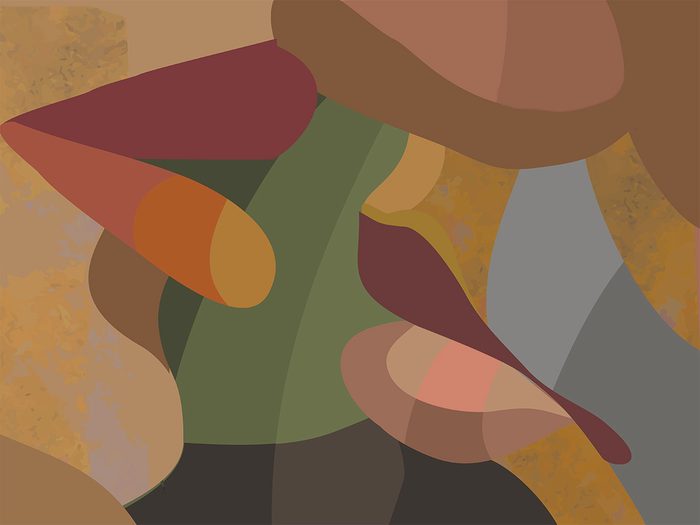I’m One of the 1/7 Canadians with Genital Herpes—Here’s What You Need to Know

And no, it has certainly not ruined my life (nor my sex life).
I remember the precise moment I thought my sex life was over. I had just emerged from a walk-in clinic into a piercing sunshine and a bustling lunch crowd, an everyday scene that seemed to mock my pain. I stood on the street in a haze, trying to digest what I had just learned—that the itch I felt was, in fact, not as harmless as I’d hoped.
Well, it had started as an itch—the kind that was all too familiar to me as a woman in my mid-twenties. It was a yeast infection. I was sure of it. What else could it be? My boyfriend of two months and I weren’t using condoms anymore, but only because he’d been tested and was “clean,” he told me.
“We may as well not even have sex if we’re always going to use condoms,” he groaned. Did condoms really make sex that bad for men? I wondered. He asked if I trusted him. Since I wanted to be the type of woman who had a boyfriend she could trust, I said I did, and we stopped using them.
When the itch morphed into a searing pain, impacting my ability to sit, pee or concentrate, I hobbled to a walk-in clinic. Lying on the paper-lined examination table, my legs splayed and the doctor’s gloved hand prodding at my vagina, she told me I didn’t have a yeast infection. I had a “massive outbreak of herpes.” I felt the walls close in on me. “That’s not possible,” I told her, “my boyfriend had recently taken an STI test.”
She explained that genital herpes doesn’t appear on traditional STI tests; only a swab during an outbreak can detect the virus. A blood test could show if you carry the virus, and which strain you have, but it can’t identify where you have it on your body—since many people carry the virus from a childhood cold sore, this isn’t particularly helpful.
I was flabbergasted. How did I not know this? I had so many questions, but the doctor didn’t seem to have time to answer them. I didn’t question her callousness at the time, it was what I thought I deserved for being so reckless that I contracted herpes. She took a swab test to determine which strain I had: HSV1 or HSV2, the former typically causing cold sores around the mouth (which 50-80 percent of people have) but can also be transferred to the genitals through oral sex, and the latter being the more contagious genital variety and the one she predicted I had.
Outside the clinic that August morning, that’s when it hit me: My boyfriend lied to me, and no one else will ever want to have sex with me again.
One of the biggest myths about herpes, according to Dr. Rob Dmytryshyn, a family doctor at Women’s College Hospital, is that it means a partner is cheating. “This infection can stay dormant for a long time,” he says. For instance, he says one of his patients had her first outbreak in her seventies, even though she’d been with the same partner for 50 years. That could be because her partner didn’t have an outbreak until later in their relationship, or she had been protected from antibodies from a childhood cold sore. Another myth is that people always know they have herpes. Due to mild, unnoticed, or misdiagnosed symptoms, many people do not know they have the virus, says Dmytryshyn. The occurrence and severity of an outbreak can depend on many things, including emotional stresses and stresses to the area, including periods, yeast infections, and an uptick in sexual activity.
When I learned this, I was relieved that my boyfriend wasn’t necessarily to blame—but that feeling was short-lived. Just weeks after my diagnosis, he phased himself out of my life. After we broke up, I discovered he had been cheating on me. Years later, I found out he had known he had the virus and had passed it to other unsuspecting women before me. In Canada, it’s a crime not to disclose to a sexual partner that you have an STI that poses a “significant risk of serious bodily harm.” But by the time I discovered he’d lied, it felt impossible to drag it back up again.
One in seven people is infected with genital herpes, and, according to Dmytryshyn, the virus can be different for everyone. Most commonly, he says “it looks like a cold sore.” HSV1, which constitutes the majority of diagnoses both orally and genitally, originated as an oral virus but it doesn’t always present the same way. “Over the last 20-30 years, the majority of genital HSV infections are HSV1,” says Dmytryshyn. This might be because more people are having oral sex than decades ago, though it can be transmitted to and from the genitals, anus, eyes or even other areas of the skin. The differences between the two viruses lie mainly in how they originated and their levels of viral shedding (during which transmission can occur) but otherwise, they present the same way.
The most common symptom of herpes is a cluster of itchy or painful blisters. They typically sprout around the mouth or in the genital region. Other symptoms include a burning sensation when urinating, difficulty urinating, and, for those with HSV-2, flu-like symptoms like fever, chills and achiness. But, herpes generally doesn’t cause further health problems. In fact, some people don’t have any symptoms at all. According to Dmytryshynhe, the only time it presents a medical nuisance is during pregnancy or with immunocompromising conditions like HIV. Unfortunately, HSV and HIV can each exacerbate the contagiousness, symptom frequency and severity of the other.
Contrary to what my walk-in doctor had speculated, my swab had come back positive for HSV1. I was surprised to find that herpes didn’t look like I thought it would. I had pictured the crusty sores seen on friends’ mouths when they were stressed, but a hand mirror between my legs displayed small, razor-thin lesions around my vaginal opening. My first outbreak was considered severe and took a couple of weeks to fully heal. I took Valtrex, a prescription herpes medication that can be used acutely or chronically, to suppress each outbreak, and stopped after the run of the treatment (just a few days). For the next few months, I felt a slight sting of a barely-noticeable lesion at my vaginal opening during the onset of my period. But within a year, I wasn’t getting any lesions at all and no longer needed the medication. Dmytryshyn says this is a common trajectory; outbreaks after the initial one are significantly less severe and increasingly less frequent.
At the time of my diagnosis, I didn’t know anyone else who had herpes. I felt alone in my suffering. So I did what anyone would do: I Googled. The more blog posts and Reddit threads I came across, where I learned about other people’s experiences with the virus, the less alone I felt. I became more comfortable, opening up to my friends and some family who were all sympathetic and supportive. Some felt compelled to share their own herpes diagnoses as well. I was not alone.
For most people, the hardest part about having herpes is not the physical symptoms of the virus, but the stigma attached to it. Although I felt comfortable telling my friends, it took me eight months to work up the nerve to go on a date, let alone sleep with someone.
When it comes to protection, Dmytryshyn advises that “barrier methods are the best way,” but still not 100 percent effective. Since herpes can be transmitted from areas not covered by condoms, monitoring symptoms is key. That means avoiding having sex when you have an outbreak. It’s possible to shed the virus when you’re asymptomatic, but the likelihood tends to decrease over time—it’s much lower than in the early days of contraction.
When I was ready to date and I met someone, I moved slowly, avoiding sex and delaying the inevitable conversation. By this point, I was no longer having outbreaks but was still afraid of the stigma. When I finally told him, I cried, awaiting disgust and rejection. It didn’t come. Instead, he said, “Thank you for telling me. I still really want to have sex with you.”
To this day, that is the only reaction I’ve ever received—aside from one man who didn’t know what herpes was, and one woman who subsequently admitted that she, too, had HSV1. She and I both teared up at our unexpected kinship. Now, I have a long-term partner, and we no longer use condoms. He is aware of the risks, which we try to mitigate by avoiding sex on the rare occasions I suspect an outbreak.
Since my diagnosis ten years ago, I’ve learned about my physical and emotional resilience, my bravery, and my worth. I‘ve learned I’m not reckless, or dirty, and that even though I contracted the virus under nefarious circumstances, most people are honest and good. I’ve had the best sex of my life as a herpes-positive person, and I’m happy to know I can continue to have much more for decades to come.




